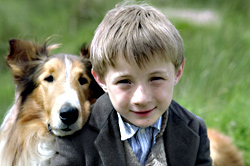I have an answer for Osama bin Laden. I have a solution to southern Lebanon. Also Iraq, gas prices, global warming, and this whole gravity situation. How, you ask? Come here, girl. Sit! Stay! Shake hands! Roll over, girl, and I’ll give you a Milk-Bone.
OK, I’ll grant you that this modest, respectful period treatment of Lassie Come-Home (originally a 1938 short story) doesn’t present the loyal collie as being able to stave off Hitler or World War II. It’s light on action, in truth, and children accustomed to computer-animated films with singing, dancing, talking animals may find their patience tested. This is a movie, after all, about a dog that arduously finds its way home, over 500 miles, from northernmost Scotland to a Yorkshire coal town, where her 9-year-old master, Joe (Jonathan Mason), waits patiently. Lassie doesn’t save any children from Nazi spy rings en route, though she does stop in Glasgow briefly to play matchmaker. Everyone is well-mannered and decent, with the exception of a cruel kennel master who removes his belt to whip Lassie. Another dog dies, nobly, but there’s no blood or overt violence to the tale.
Yet it is scary in an important way that children need to be scared. The mines are closing. Joe’s father (John Lynch) is soon out of work and must join the army. (Bad timing, we know.) They need the money offered for the family pet by an aristocrat (Peter O’Toole) to please his lonely granddaughter. This is the Depression, when families are broken up and go hungry. Though Joe naturally misses his dog, he understands his parents’ decision and doesn’t argue with it. (Perhaps this is because Nintendo hasn’t been invented yet.) As his mother, Samantha Morton best expresses this anguished balancing of the family budget—whether to feed her son or break his heart.
Director Charles Sturridge (Brideshead Revisited) only parts with prewar standards by using a few slo-mo shots for canine stunts; otherwise, the details and performances feel buttoned in sound, 68-year-old British wool. Parents will also enjoy the aerial landscape shots and choice supporting players (including Peter Dinklage and Kelly Macdonald), but this is a movie that primly resists embellishment. Its signal quality—not that modern kids would use the word—is what they’ll instinctively recognize in the dog: fidelity. Which, today, is a positively novel accomplishment. BRIAN MILLER








